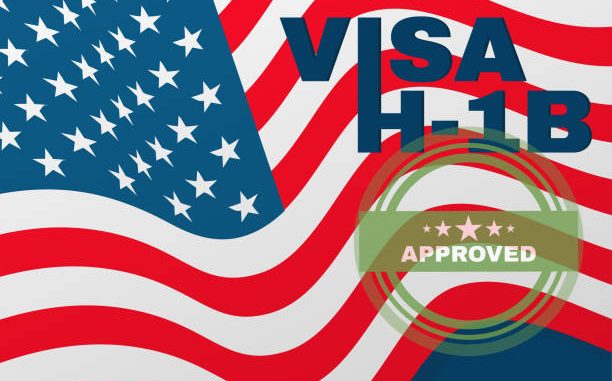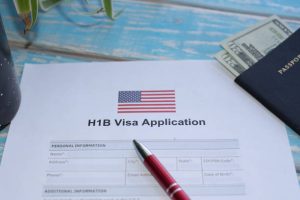
The H-1B is the US temporary residence visa that allows legible employers in the US to hire international employees.
The role is Certificate based as it requires at least a bachelor’s degree to merit it.
And it’s for skilled individuals in technology, finance, engineering, architecture, or more.
This can be your chance to live and work in the US which can be a sure leak to permanent residence. In this article, I’ll show you the way around the H-1B visa.
H-1B Visa Eligibility
To obtain an H-1B visa in the USA, you need to meet certain eligibility criteria.

The H-1B visa is designed for foreign workers who wish to work in specialized occupations that require a high level of education or expertise. Here are the key requirements:
Educational Qualification
You must have at least a bachelor’s degree or its equivalent in a specialized field. The degree should be relevant to the job you are seeking in the United States.
Job Offer
You must have a legitimate job offer from a U.S. employer who is willing to sponsor your H-1B visa. The job offer should be for a specialty occupation that requires specialized knowledge and skills.
Employer Sponsorship
Your employer must file a petition on your behalf with the U.S. Citizenship and Immigration Services (USCIS). The employer must demonstrate that they are offering you a job that meets the criteria of a specialty occupation and that you possess the required qualifications.
Labor Condition Application (LCA)
Before filing the H-1B petition, your employer must obtain an approved LCA from the Department of Labor (DOL). The LCA ensures that your employment does not adversely affect the wages and working conditions of U.S. workers.
Valid Employer-Employee Relationship
You and your employer must establish a valid employer-employee relationship, where your employer has the right to control your work and supervise your employment.
Capped Occupations
Some occupations are subject to an annual numerical limit, known as the H-1B visa cap.
This limit is set at 65,000 visas per fiscal year, with an additional 20,000 visas reserved for individuals who have earned a master’s degree or higher from a U.S. institution.
However, certain categories such as universities and research institutions are exempt from the cap.
Understanding The H-1B Visa Cap
The H-1B visa cap refers to the annual limit on the number of H-1B visas that can be issued by the U.S. government.
The purpose of the cap is to control the number of H-1B visas granted each year and ensure a fair distribution of visas among different industries and occupations.
Here’s what you need to know about the H-1B visa cap:
Regular Cap
The regular cap for H-1B visas is set at 65,000 visas per fiscal year. This means that once the annual quota is reached, USCIS will not accept any more H-1B petitions, except for certain exempt categories.
Master’s Cap
In addition to the regular cap, there is an additional allocation of 20,000 visas for individuals who have earned a master’s degree or higher from a U.S. institution. This brings the total number of H-1B visas available to 85,000 for those with advanced degrees.
Exempt Categories
Certain employers and occupations are exempt from the H-1B visa cap. This includes universities, research institutions, and nonprofit organizations affiliated with educational institutions.
Employees who have previously been counted against the cap are also exempt if they are extending their H-1B status or changing employers.
Cap Lottery
When the number of H-1B petitions exceeds the available visas, USCIS conducts a random lottery to select the petitions that will be processed.
The lottery system aims to ensure a fair chance for all applicants, regardless of when their petitions are filed.
How Much Does the H-1B Visa Cost?
Obtaining an H-1B visa involves certain fees that need to be paid by the employer or the employee. Here’s a breakdown of the costs associated with the H-1B visa:
Filing Fee
The filing fee for the H-1B petition is set by USCIS and is subject to change.
It typically includes the base filing fee, the ACWIA fee (used to fund job training programs), and the Fraud Prevention and Detection Fee.
The total filing fee can range from several hundred to several thousand dollars, depending on the size of the employer and other factors.
Attorney Fees
Many employers hire immigration attorneys to handle the H-1B visa application process. Attorney fees vary depending on the complexity of the case and the attorney’s experience. It’s important to note that attorney fees are separate from government filing fees.
Premium Processing
If the employer wishes to expedite the processing of the H-1B petition, they can opt for premium processing by paying an additional fee.
Premium processing guarantees a response from USCIS within 15 calendar days.
Dependent Fees
If you have dependents (spouses or children) who will accompany you to the United States, there may be additional fees for their visa applications and related expenses.
H-1B Visa Process
- Once selected, your employer files a petition on your behalf.
- Your employer submits a Labor Condition Application (LCA) to the Department of Labor (DOL) for Certification.
- After LCA certification, your employer completes Form I-129 and submits it with the LCA to USCIS, along with fees and required documents.
- If approved, two options: If you’re in the US on a different visa, wait for H-1B status activation to start working.
- If outside the US, complete Form DS-160, pay fees, schedule an interview at a US embassy/consulate, and bring the necessary documents.
- Prepare for interview questions about yourself, the job, experience, employer, and travel history.
- For interview preparation with an immigration attorney, Boundless offers a call with a vetted attorney for $49.
FAQs
Who can sponsor the H-1B visa?
Any U.S.-based employer with an IRS Tax ID Number can sponsor the H-1B visa.
Can I apply for an H-1B visa if I don’t have a job first?
No, you need a job offer from a U.S. employer before you can be eligible to apply for the H-1B visa.
Conclusion
The H-1B visa is a popular nonimmigrant work visa that allows U.S. employers to hire foreign workers with specialized skills.
It has specific eligibility requirements and a limited number of visas available each year. The visa process involves registration, petition filing, and potential consular processing.